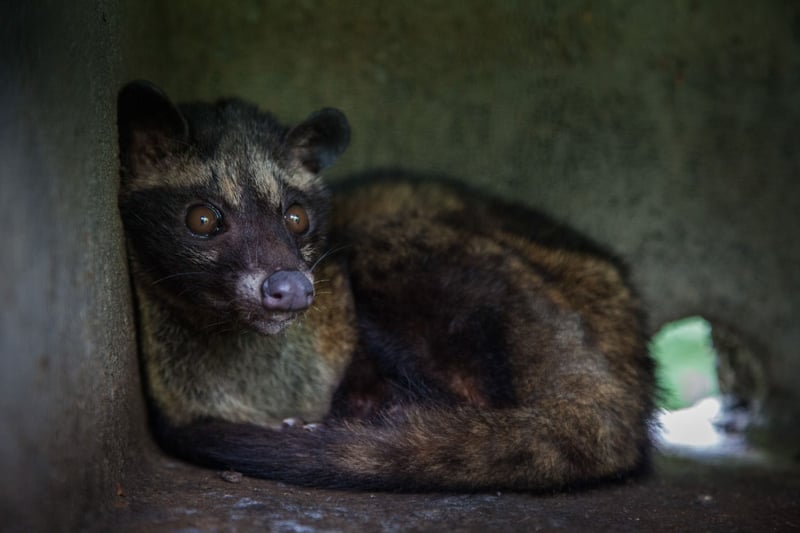
Civets enslaved in growing demand for tourism and luxury coffee
Press release
The demand for the world’s most expensive coffee is on the rise due to tourism, reveals a new study from global charity, World Animal Protection today [30th April].
Civet coffee, or Kopi Luwak as it is also known in Indonesia, is produced across the island of Bali, by civet ‘cats’, who are poached from the wild and kept in cramped barren cages to produce gourmet coffee for visiting tourists.
The distinctive tasting coffee can cost up to 100 $USD for a single cup and is already popular with coffee drinkers across Europe and the USA. The coffee beans produced are digested by the civet cat, the faeces of the cat are then collected, finished and sold as Kopi Luwak.
Researchers from World Animal Protection have discovered that the novelty drink is on the rise, with more than 16 different civet coffee plantations emerging along one popular tourist highway of Gianyar and Bangli in Bali in the last 5 years alone. The study revealed:
The 16 new plantations were all intended for international tourists visiting Bali
Fourteen of the 16 plantations produced the caged civet coffee on-site
The two plantations that did not produce caged coffee on-site confirmed that they kept civets in cages purely as a tourist attraction to illustrate to tourists how the coffee is made
This high-end pricing has turned farming civet cats for coffee into an enslavement industry. The animals are snatched from the wild, kept in cramped cages where wire floors cut into their feet causing them physical and mental distress. They are also nocturnal and do not have shelter to hide. Many of the civet coffee farmers are uneducated on how to care for their animals and the civets often are often ill or die, all in the name of making coffee.
Wildlife researcher, Dr Neil D’Cruze at World Animal Protection says ‘Civets are highly active nocturnal animals, that are poached from the wild and kept in cramped cages simply to draw in visiting tourists who are curious to know how ‘civet coffee is made.
‘When tourists see the caged civets it helps to convince them that they are drinking genuine real civet coffee as part of their tour. Sadly, many tourists are blind to the cruelty associated with caged civet coffee and even queue up to take a photo to share on social media’.
World Animal Protection first uncovered the cruelty associated with caged civet coffee in 2013. As a result, at least 13 retailers – including well known brands such as Harrods and Selfridges in the UK and Simon Lévelt in the Netherlands – took civet coffee off their shelves or agreed to further investigate.
Joint author of the study, Dr. Jan Schmidt from World Animal Protection said: ‘Detecting cruel civet coffee remains a constant challenge because of the difficulty in distinguishing between beans from caged or wild civet cats. However, if tourists see civets in cages as part of their tour this is a clear indication that unnecessary animal abuse is involved.”
World Animal Protection is calling for tourists to avoid these cruel caged civet coffee plantations when on holiday. Any tourists tempted by the novelty should only choose ‘cage- free’ civet coffee instead, it’s good for wild animals, good for conservation, good for coffee connoisseurs and good for rural communities, who can continue to generate an income from tourists.
ENDS
Notes to editors:
- For an interview with a spokesperson or high-res images, contact Kai Akram kaiakram@worldanimalprotection.org +44 (0) 7939 029 006.
About Civets:
- Asian palm civet (Paradoxurus hermaphroditus): The Asian palm civet is a small mammal native to South and Southeast Asia.
- Diet: Asian palm civets are omnivores with a broad diet ranging from rats and insects to fruits such as berries, mangos and bananas.
- Behaviour: Asian palm civets are believed to lead a solitary mainly nocturnal lifestyle. They are well adapted for living in forests and enjoy climbing trees.
- Habitat: Asian palm civets can be found in the temperate and tropical forests of South and South East Asia.
- Threats and status: Asian palm civets are believed to be one of the most common species of civet. However, growing demand for civet coffee, has led to an increase in civets being captured from the wild and fed coffee beans to produce this unusual beverage.